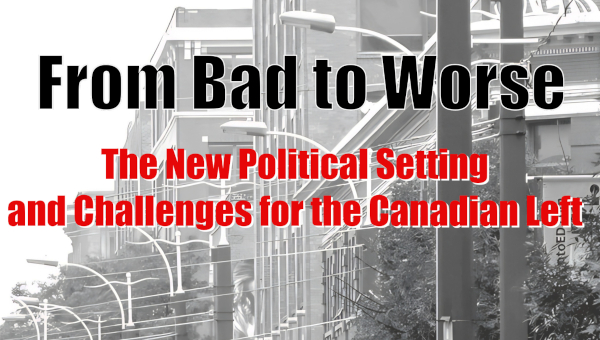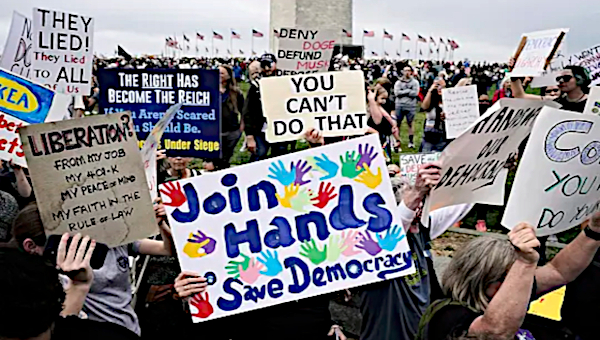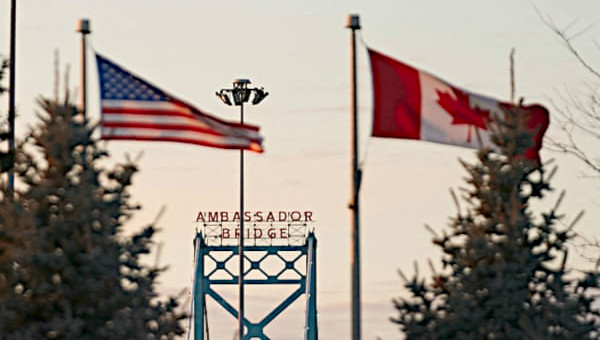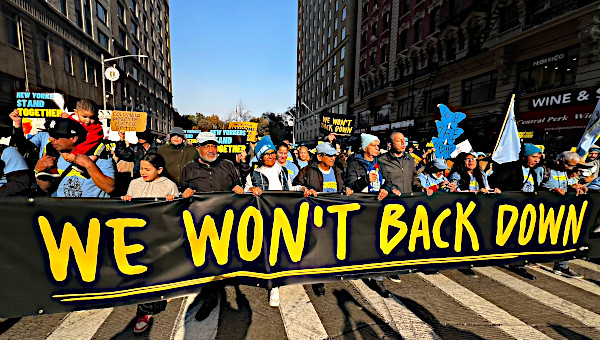Trump’s Threats, Canadian Challenges
Former Canadian prime minister Pierre Trudeau once said that the Canada-US relationship resembled a mouse sleeping with an elephant: “No matter how friendly and even-tempered is the beast, if I can call it that, one is affected by every twitch and grunt.” — Quote from Jonathan Malloy, Inside Story, 13 July, 2018.
US President Donald Trump blew the bugle: Canada should be the 51st State, perhaps he might legally annex it, certainly hold it responsible for its failures as border watchers, for allowing undesirable people to flow into the US and permitting drug peddlers to supply the insatiable consumer market in the US. More, Trump bellowed, Canada’s spending on its military is forcing the US, as the defender of all that is good and holy, to bear an unfair burden.

This has pushed all kinds of Canadians to focus on some verities. Not new verities, of course. Canadians have been conscious of the fact that, economically, they have always been closely integrated with US markets, a fact of life that became more embedded after the conclusion of the FTA/NAFTA, agreements that nationalists fought against tooth and nail, an opposition that had withered by 2020 when a redrafting of these trade agreements led to the USMCA replacement. Canadians have always understood that they are the junior partner in many of these relationships and that, all too often, the term partner flatters the relationship. They have been conscious of the fact that all this economic entanglement and subjugation has made it very difficult for Canada to act as a politically sovereign country.
Canada’s Anxieties
These ever present anxieties have been revived by Trump. Proud Canadians want to avert the further erosion of independence. They are seeking compromises, a softening of the brutish US assault. Many point to the lack of evidence for Trump’s claims that Canada’s so-called failures are having any significant adverse impact on the US (as in drawing attention to the fact that the amount of fentanyl coming from Canada is a truly tiny fraction of the smuggled drug). Others criticise him for his flawed belief that the imposition of tariffs makes economic sense and point out that this will injure the US in the end; yet others remind the US what good friends and allies Canadians have been throughout history and that other less reliable countries, like Mexico, should be the target of tariffs (as Ontario Premier Doug Ford has argued). And many call for calculated retaliations and debate whether this is best done by countering tariffs or by export bans.
This revived consciousness of the fact that the land we call Canada has never resolved all of the barriers to its economic and political emancipation and that it can ill afford any further descent into a serf-like polity status is to be welcomed. Even though it is Trump’s arrogant re-assertion of the US might that has always existed, rather than self-inspired introspection, that has reminded Canadians of their incomplete agenda to establish a truly independent, sovereign polity it does put a dormant struggle back on the agenda. That struggle is for a polity that rejects the logic of capitalist relations of production, of its emphasis on the sacrosanct nature of private property, freedom of individual contract-making, and the attendant ideology of anti-collectivism. It is a fight to delegitimate the mantra that our social relations should privilege the primacy of individual self-interest as the engine of welfare. Many have held these alternative views for a long time, but their efforts to make them a reality in the land we call Canada have been muted, seriously marginalized, precisely because we have been so deeply integrated in the economy and accompanying political understandings of the US.
The possibility that Canadians might be radicalized is not the kind of resistance that Trump believes he may be unleashing. He does expect our political leaders to react but to do so within the context of their long-established position of economic subjugation and political compliance. As they seek some relief, some limitations on his threats, he undoubtedly believes he will be able to squeeze more out of us, to have our leaders agree to more fealty, to give him some goodies his MAGA brain desires. At this stage, this seems the likely outcome of what is going to be a long-playing bargaining drama. Progressive people should try to avert the further enfeebling of control over our lives, over the social relations by which we want to live.
De-Linking from the US?
Canadians must dare to think about parting ways – economically, politically, and socially. They must begin to de-link our economy from that of the US. This is no small ask. To begin to make inroads, they must persuade each other that the political concept that capitalism is the only way to create welfare for most people is not only untrue but also dangerous, as it is the chief reason why the people of the world are confronted by an ecological crisis of an existential nature. In short, we must be willing to think of ourselves as abolitionists of capitalism and promoters of socialism. We must begin by re-imagining our polity as a distinct one that requires its major founders – Indigenous peoples, Québécois, and Anglo-Canadians – to form a consensus based on a politics aiming for the common good of all, while respecting the relative autonomy of each group to reach for that common good in its own special way.
Impossible as it all may seem to achieve, with Trump having spurred people into action, the moment should be seized. If it is not, it is certain that Trump and his successors will get what they want: more of our resources; more of our complicity in the US imperial projects, wars, and pillaging; more of our adherence to a system of social relations based on increasing inequality and the satisfaction of greed, and the destruction of the environment. But we must be honest with ourselves. There are powerful reasons why not enough of us may want to grab this slim opportunity that this Trump-driven crisis proffers. The road to a better society is a hard road to travel.
Inevitably, the call by one and all to resist, to retaliate, to stand-up to the bully next door, comes inside the attractive wrapping provided by nationalism and patriotic pride. Mainstream political parties are already taking advantage of this: they are positioning themselves as the rightful leaders of the nationalistic/patriotic fight-back. This posture will be reinforced as, by chance, two major elections are about to be fought during which we can expect each of these mainstream parties to emphasise how tough they will be in wringing concessions from Trump, the arch enemy of all that is Canadian that makes us an enviable country. Many Canadians, angered by the US, will ally themselves with one of these parties in the hope they will deliver some of the things they promise. What may all too quickly disappear from view is the fact that all of these parties and their allies in the media and chattering classes and, most importantly, Canada’s own capitalist class, have been, and seemingly remain, eager to be integrated in the US economy. Indeed, many of the pronouncements from these opinion-makers are about the advantages of a common economic bloc, one in which tariffs play no significant role.

Moreover, all of them have been accepting of the fundamental notions of the primacy of private wealth ownership (just ask Indigenous peoples) and of a society based on individualism (just ask unions about the difficulties of advancing collectivization or ask NGOs about the ever-intensifying assaults on the social wage). In short, when these mainstream parties – and their supporters in the lamestream media, intellectual circles, and big business – demand that Canadians should look to them to serve as the vanguard of a resistance movement, they are not likely to question the logic of US imperialist thinking and doing. At best, they will focus on bringing the US back to a less aggressive, a less punitive stance when dealing with its subordinated partners. Regrettably, their posturing as fierce nationalists may garner support from many of the Canadians who, for the moment, are angered sufficiently to be open to consider more radical responses. The powers that be, the ones that pushed us into occupying the dependent position we hold in the US economic bloc, are likely to suck the oxygen out of any movement toward activating for more radical changes. They are likely to guide working class transformative demands into safer harbours by winning some concessions, some compromises, or at least, fighting hard to get them and, thereby, nailing down the legitimacy of a system of social relations that allows one class to dominate another. We must be aware of this danger and blunt its impact by some truth-telling.
We must make it plain that the mainstream parties and their allies are asking us to believe in something that is not true. Implicit in the idea that we are all on the same page when it comes to thinking of the land that we call Canada as a sovereign polity is the faulty notion that our country is one in which a kind of social and political cohesion prevails. Class and our founding history disappear from view. These cheerleaders for the status quo aver that, while differences exist between individuals and groups, there is a strong set of bonds, social/cultural/historic and economic/political, that bind us and undergird, in an overarching way, a uniformity of goals and aspirations. This is why these political forces claim that they stand-and are fighting-for a concrete form of existing nationalism that can be characterized as distinct. This is palpably untrue.
Three Distinct Peoples
All Canadians know that there are at least three quite distinct peoples occupying the land we call Canada: the Indigenous peoples, the Québécois, and the Anglo-Canadians. Within each of these groups, there are further differences but, overall, they are identifiably different groups with different histories and cultures. They occupy distinct and uneven positions in terms of political and economic influence in the overall polity. The groups live with unresolved tensions arising from their distinct pasts and present circumstances. It is vainglorious to speak of a single Canadian identity, a distinct Canadian national project, as things stand. Those who claim to be defending Canadian nationalism, ignoring this fundamental set of unresolved national tensions, are likely to go to a default position. They are likely to make their arguments and to seek outcomes that dovetail with what they see as being in Canada’s interest. They will define that interest by reference to the prevailing distribution of economic/political and ideological power, a state of affairs that has kept the Indigenous peoples and Québécois with much less autonomy, much less control over the special ways in which they might prefer to live and, of course, the working class subjugated to capital.
This indicates that one component part of a movement intent on using the MAGA-inspired bullying to develop transformative demands might well have to be the recognition of a federal state in which the thus-far marginalized founding groups are given much more autonomy over their own affairs. The struggle against US imperialism might have to include endeavours to right historic wrongs. In the language of some advocates during the Charlottetown debates [1992], Canada would become a much more democratic polity if it accepted a three-nation asymmetric constitution. The difficulties associated with opening up this can of worms are manifest. But the benefits might make it worthwhile. A struggle of this kind allows for the mounting of a challenge to the current default position, heavily supported by Anglo-Canadian capital, that the credo of individual and competitive unfettered markets is part and parcel of the country we call Canada.
Culturally, Quebec has shown occasional preference to pursue a governance model that sees great value in binding communities in pursuit of some remembered common values. Indigenous peoples, although now much more fractured than before, have shown a historical preference for decision-making by a collective consensual outcome. Both starting points, even though they are not dominant ones, reject the US-preferred model, so embedded in the thinking and acting of Canada’s ruling class and its political and ideological leaders. Both starting points question the subordination of the working class. Reinforcement of contrasting ideas and ideals by newly important and legitimated components of the national entity would offer a basis for not only resisting but rejecting a continuation of the US model of capitalist relations of production. It would be easier to do what needs to be done, namely to escape being tangled in the economic, and therefore, political and ideological, web spun by the chief spider, Trump, his predecessors and successors.
That escape will not be easy. It requires a re-thinking of how we are going to create welfare, and how we are going to address problems that cannot be kept out by borders, such as environmental harms, finance mobility, and the capabilities of AI. While there are no obvious ways as to how this can be done, it must be tried.
Re-Imagine a New Canada
We should push fiercely to enhance and enrich the care economy. We should shield our resources from foreign and domestic capitalists so that we can build our own environmentally-appropriate infrastructure, to provide shelter to all who need it. We will have to win control over major industries. We have to accept that Indigenous peoples should have the final say as to how the resources on their ancient lands should be used; mere consultation with them is not enough. We have to return to the public sphere that which has been stolen from it by the deregulation, privatization, public/private partnership models. We will have to fight to have workers control the huge funds to which they contribute in order to provide for their own security but which currently are controlled by financial institutions and employers who use those funds to serve their capitalist interests, all too often to the detriment of the workers.
This incomplete list is daunting enough; there are other issues to be tackled. Equally confounding is how we can organize a critical mass of fellow travellers and, then, how we might strategize to get any of these huge tasks underway. Difficult, yes, but what is clear is that the anxiety created by Trump, the concern that we are no longer in control of anything, has given us a moment in which the wider public might be persuaded that a movement for radical change might make sense. We must try and seize that moment. I have no sword with which to cut through the Gordian knot created by the prevailing dominant ideas and practices and supported by the Canadian capitalist class and its cheerleaders, but I do sense that if we just go along with the appeasers and compromisers, we will be even worse off as a polity, as a set of peoples.
We must re-imagine a Canada that can produce goods and services to furnish people’s needs. We must reject profit-maximization as the incentive to produce. We must take the opportunity, slim as it is, not just to alleviate the hurts with which Trump threatens us, but also to make it clear that he is building on a system that has undermined our control over our lives, our aspiration to be democratic and respectful of all people, our desire to find reward in our lives by serving all others in our society rather than our own welfare. It is rare for socialists to be presented with a circumstance in which capitalists make it brutally clear that they do not give a damn about human beings. Trump’s loutish disregard for the niceties of argument has given us an opportunity to say: “Enough already. Let us try something new, something humane.” •





